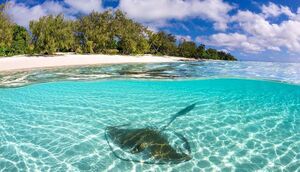Karaihe Marine Reserve: Difference between revisions
Jump to navigation
Jump to search
mNo edit summary |
mNo edit summary |
||
| Line 74: | Line 74: | ||
}} | }} | ||
The '''Karaihe Marine Reserve''' is a maritime protected zone facilitated and maintained by [[Association of Malaio Ozeros Nations]], acting as a intergovernmental authority for regulations, treatment and observation over the area- holding territory within both [[Pulau Keramat]] and [[Onekawa-Nukanoa]]. The reserve is | The '''Karaihe Marine Reserve''' is a maritime protected zone facilitated and maintained by [[Association of Malaio Ozeros Nations]], acting as a intergovernmental authority for regulations, treatment and observation over the area- holding territory within both [[Pulau Keramat]] and [[Onekawa-Nukanoa]]. The reserve is one of the largest of its kind throughout all of [[Ajax]], and hosts several protected environmental zones that are known to be critical for the proliferation and growth of several maritime species, some of which have become entirely endemic to the territories protected within the reserve. | ||
==History== | ==History== | ||
Revision as of 21:01, 6 May 2021
| Karaihe Marine Reserve | |
|---|---|
IUCN category II (national park) | |
 | |
| Location | Karaihe Sea |
| Nearest city | Puahng Jerehannak |
| Area | 842,314 km2 (325,219 sq mi) |
| Elevation | Sea Level |
| Established | 6 May 1985 |
| Visitors | 2,340,000 (in 2020) |
| Governing body | Association of Malaio Ozeros Nations - International Conservation Agency |
| Website | karaihemaritimereserve.org |
| Karaihe Maritime Reserve | |
|---|---|
| Raji | ตาแซฟไฟร์ |
| Literal Meaning | "Sapphire Eye" |
The Karaihe Marine Reserve is a maritime protected zone facilitated and maintained by Association of Malaio Ozeros Nations, acting as a intergovernmental authority for regulations, treatment and observation over the area- holding territory within both Pulau Keramat and Onekawa-Nukanoa. The reserve is one of the largest of its kind throughout all of Ajax, and hosts several protected environmental zones that are known to be critical for the proliferation and growth of several maritime species, some of which have become entirely endemic to the territories protected within the reserve.